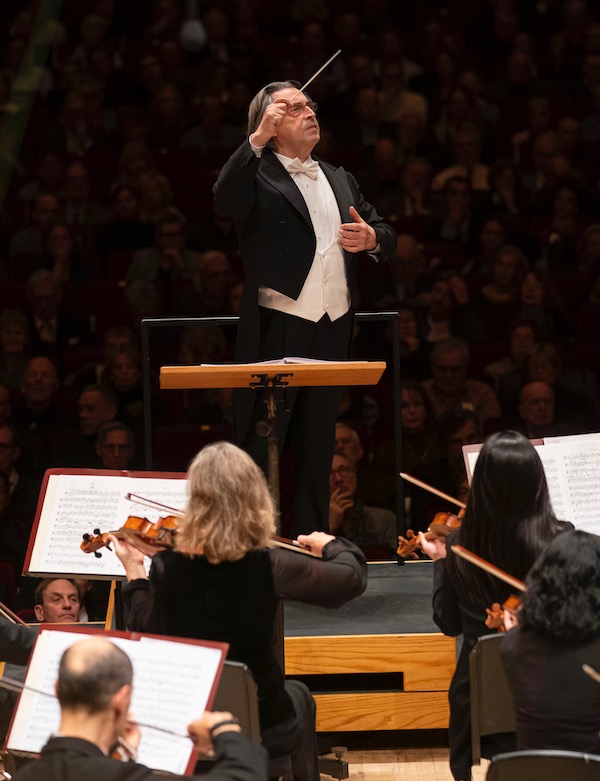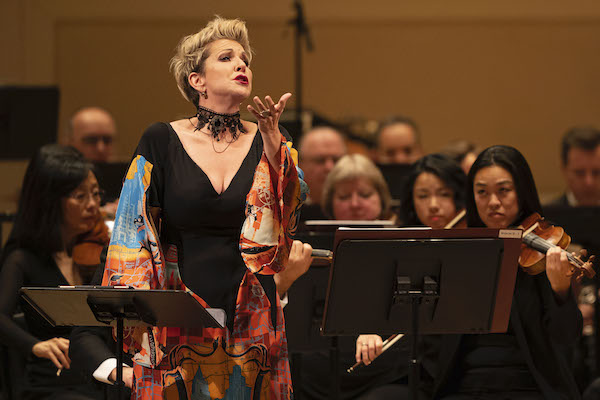Muti, Chicago Symphony return to Carnegie bearing small gifts

When an orchestra, major or minor, hits the road, the aim is to impress by playing music that not only shows off how good they are but how interesting and relevant.
By that measure, the Chicago Symphony Orchestra’s concert in Carnegie Hall Friday night showed a group, as led by music director Riccardo Muti, that seems complacent and self-satisfied with their renown as a celebrated ensemble and not overly concerned with much else.
Not that the orchestra playing wasn’t high-quality—it was and at times was even magnificent. But except for the centerpiece of mezzo-soprano Joyce DiDonato in Berlioz’s La mort de Clèopâtre, the programming and evening were ordinary and at times dull.
Without DiDonato, the orchestra played Georges Bizet’s Roma to start the concert and Respighi’s showpiece, Pines of Rome, as the grand finale. Each gave the ensemble a chance to show off their sound, the plush strings and tremendous brass section, and the extreme quality of their skills of blend, intonation, and group dynamics.
But one could enjoy only so much artistry because there was so little of interest in the material. Roma is an utter mediocrity, a set of middling themes deployed via rote methods. A symphony in all but name, it has an interesting opening, with the brass playing a hymn, but nothing else that can be remembered past the previous measure. Although the program notes tried to promote some hidden qualities, there’s a reason the Chicagoans hadn’t played it in its entirety for 125 years, and no reason to discern why Muti may have unearthed it.
Except perhaps that it’s easy, and for a group and conductor like this takes little effort. That is a factor of taste that is suspect in that it is self-serving, meant to be unobjectionable. But it’s also unexceptional to have blandly palatable good taste, and the Chicago Symphony Orchestra used to have ambitions to being an important ensemble, not just a good one.
Yet they are good, and Friday night they were very good. Pines of Rome was enjoyable as it went alone because one could admire the fine playing from note to note. Clarinetist Stephen Williamson and trumpeter Esteban Batallán played their solos with sounds that were the ideal of beauty on their respective instruments. The long orchestral crescendo in the closing movement, “Pines of the Appian Way,” was musically exciting, and the mix of the off-stage brass—placed in the front boxes stage right and left—was masterful, all of one piece while extending the sonic field into new dimensions.
Still, one kept thinking of how Chicago used to make, say, Bartók’s Concerto for Orchestra their own, playing as if what they were doing truly mattered.

Making meaningful music is still possible, as they demonstrated with Berlioz’z concert aria. DiDonato was fabulous, of course. She exploded with drama from the very first notes. That is always inherent in the sheer sound of her voice, the scope and power of which are exciting on their own. But her commitment to telling the story of the song was complete and intensely felt.
The way she shaped phrases and the vocal line are what make her a superior musician. When she gradually pointed verses until they detonate on “And I, a daughter of the Ptolemies,” or the serene resignation of “Gods of the Nile, you have betrayed me!”, she made the aria personal and not just a performance, but something real.
This was where the orchestra and Muti were the most real as well. The sense of listening and response from the musicians was superb, and Berlioz’s amazing closing pages, with the strings slowly respiring, turbulent and then still, had as much intensity, and were as fulfilling, as DiDonato’s singing. The resources are there, if only more effort were made to utilize them to higher ends.
The Chicago Symphony Orchestra plays Prokofiev’s Symphony No. 3 and selections from Romeo and Juliet 8 p.m. Saturday. carnegiehall.org
Posted Nov 17, 2019 at 8:38 pm by Willi Philips
This review is based solely on a judgment call of what represents substantial music versus kitsch. Yes, Respighi is kitsch, but it is good kitsch, and it is a pleasure to have it heard played by the orchestra that produced the first momumental stereo recording of it in the late fifties or early sixties with Reiner. The performance, though 98+% of the orchestral membership is new since then, is derivative of that fantastic release.
The argument is a poor one. If a major Beethoven Symphony had been played, or a major violin or piano concerto, the argument would have immediately switched to “Well, why do we have to hear an oft-performed Brahms Symphony when there is so much else that is worthy that is unheard or rarely heard?”
Why not just take the repertory at face value, and delete the insupportable opinion, not fact, that the orchestra seemed complacent and self-satisfied which is completely nonmeritorious and not provable. this is to me an unreasonable criticism by a someone who has barely nothing nice to say about one of the world’s great orchestras.